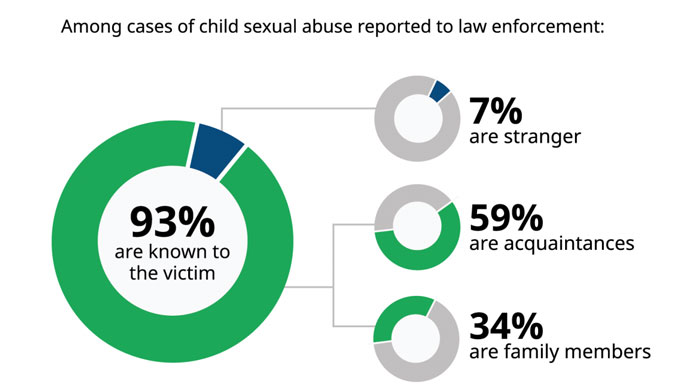What is child abuse?
Child abuse is any kind of emotional, physical, or/and sexual maltreatment. It can also occur because of a lack of care which may lead to emotional damage or risk of serious harm to a child.
Types of child abuse
Emotional abuse
When a parent or some person abuses the mental and social development of a child or causes serious emotional harm, it is known as emotional abuse. Ignoring, rejecting, exploiting, and isolating are some of the types of emotional abuse.
Physical abuse
Physical abuse occurs when a child observes violence being done by any of the family members or a person in trust.
Sexual abuse
Child sexual abuse is when a child is being used by an adult for sexual purposes or sexual gratification or excitement.
Neglect abuse
When a parent or person in trust does not take care of the child by not providing supervision, support, and affection to the child’s safety and health, it is considered Neglect abuse. Physical neglect, Educational neglect, and Emotional neglect are some of the forms of this abuse.
Child abuse incidents
Studies have shown that child abuse incidents are higher in the following cases.
-
- Families with spouse abuse.
- Parents with high school dropouts.
- People who are living below the poverty level or are financially stressed because of a loss of job or home.
- Families where alcohol or drug is highly consumed.
Ways to prevent child abuse
Each child deserves the right to grow up and live in a secure and healthy environment. However, many children these days observe child abuse. Child abuse occurs within all religions and at all the levels of education. Children are often abused and neglected by the ones who are closest to them, which also includes their family. Everyone can come forward and contribute to preventing child abuse.
-
- Parents should try understanding their children. They should learn how children behave and what can they do at different ages. The most important thing is that parents should have realistic and practical expectations and be reasonable if children are not able to meet.
-
- Always keep the children healthy. Refusing food, sleep, or any other care to children is abuse by neglect.
-
- Get away from alcohol or drug problems. Should educate children to keep away from anyone who abuses such substances.
-
- Watch your words. Should not be furious and avoid using angry language because it can leave emotional scars for the whole life of the children.
-
- Get yourself controlled before disciplining a child. Give clear directions so that the child should know what is expected from him/her. Avoid physical punishment.
-
- Make home a violence-free place. Should educate child not to watch violent TV shows. Don’t let children stay with an abusive person under the same roof.
Teach your own children to prevent abuse
We just read above how can parents or society stop child abuse. At the same time, parents also need to educate their children on how to be careful.
Educate about body parts
Name body parts and talk about them at an early age. Body part names should be properly used and teach your child the actual words for their body parts. There are many children who still call their vagina “bottom.” The children should feel comfortable using these words and it can also help them talk clearly if something wrong happens with them.
Educate them that some body parts are private
The children should be made aware of their private parts that they are not for everyone to touch and see. They should be explained that only their parents can see them naked, however people outside of the home should see them with their clothes on. There may be an instance where children ask how doctors can see them without their clothes. In the case, they should be explained that because the doctor is checking their body in the presence of their parents.
Educate children to discuss body secrets
Most culprits tell the children to keep the abuse a secret. They often say it in a friendly way, such as, “I will keep playing with you, however, if you tell anyone in the family or outside what we played, they would not allow me to come again.” It can be a threat sometimes, such as, “This is our secret and if you tell anyone about it, you will get into trouble.” The children should be explained that no matter what anyone tells them, they should not keep the body secrets and should always inform the parents if someone has tried to make them keep a body secret.
Educate children about body boundaries
The children should be made aware that no one should ask them to touch someone else’s private parts and no one should touch their private parts. Parents usually forget to tell about the first part of this sentence. Sexual abuse usually begins with the culprits when they ask the child to touch them or someone else.
Educate children on how to get out of uncomfortable/scary situations
There are many children who are uncomfortable in saying “No” to people, especially to older or adults. The children should be explained that they should tell an adult that they have to leave if they feel something wrong is happening.
Educate children that no one can take pictures of their private parts
Parents often forget this one. There are many people in the world who like to click and trade pictures of naked children online. This puts children at risk. The children should be explained very well that no one should take pictures of their private parts.
Give a code word that children can use when they feel unsafe
The children can also be given a code word that they can use when they want to be picked up. It can be used at home as well, when there are relatives or guests in the home or when they are on a play.
Educate children that a body touch may feel good
There are books that talk about good and bad touch however it can be confusing because these touches often do not hurt or feel bad so the children should be explained about it well.
Child Protection Act, Laws Against Child Abuse
National Policies in India to Protect Child Right
The major policies that have been formulated to ensure child rights and improvement in their status are:
-
- National Policy for Children, 1974
- National Policy on Education, 1986
- National Policy on Child Labour, 1987
- National Nutrition Policy, 1993
- Report of the Committee on Prostitution, Child Prostitutes and Children of Prostitutes and Plan of Action to Combat
- Trafficking and Commercial Sexual Exploitation of Women and Children, 1998
- National Health Policy, 2002
- National Charter for Children, 2004
- National Plan of Action for Children, 2005
Statutes dealing with the Protection of Children in India
Following Acts were made for the welfare and protection of the rights of the children:
-
- The Indian Penal Code, 1860
- The Immoral Traffic (Prevention) Act, 1956
- Child Labour (Prohibition and Regulation) Act, 1986
- The Pre-natal Diagnostic Techniques (Regulation and Prevention of Misuse) Act, 1994
- The Juvenile Justice (Care and Protection of Children) Act, 2000
- The Commissions for the Protection of Child Rights Act, 2005
- The Prohibition of Child Marriage Act, 2006
- Protection of Children against Sexual Offences Act, 2012
Where to make a Complaint
-
- A complaint to abuse of a child can be made to the nearest police station or a call can be made to Police helpline number which is 100 or to Childline a 24 hours free telephone helpline service at the number 1098.
-
- In case the police fail to register an FIR or do not investigate the case, the disappointed can write an application to the Superintendent of Police under Section 154(3) of CrPC.
-
- Even if the Superintendent of police fails to take necessary action, or no proper investigation is held, the disappointed can file an application to District Magistrate under Section 156(3) of CrPC.
-
- A complaint can also be addressed to:
Chairperson
National Commission for Protection of Child Rights
5th Floor, Chanderlok Building, 36, Janpath,
New Delhi – 110 001
E-Mail: [email protected]
-
- An online complaint can also be made at the website of the National Commission for Protection of Children’s Rights and/or at the website of the National Commission of Human Rights.
Last few words
From childhood, parents teach children to take care of many things such as watch the hot water, look at both the sides before crossing the street. However, body safety is not educated until much older. Research proves that before the age of 18, 1 in 6 boys and 1 in 4 girls are sexually abused. Next statistics is even scarier – According to a US department, just 17% of culprits were strangers to the child however rest of the culprits were known to children.















